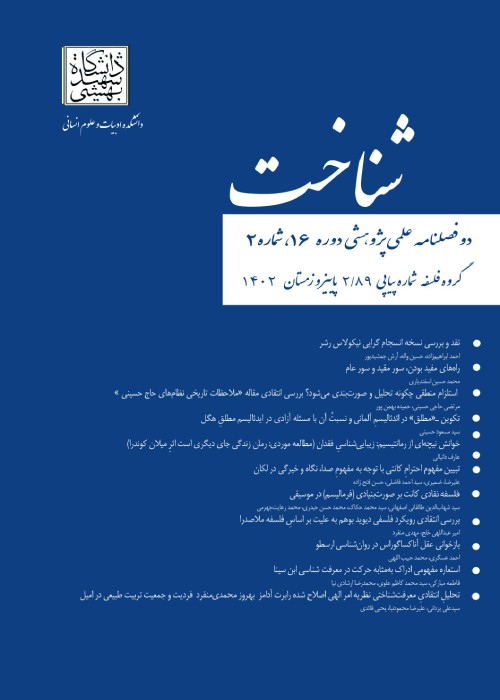The nature of "first propositions" in Aristotle's philosophy and its relationship with the self-evident propositions
The basic problem of this research is the analysis of the quiddity of the first propositions (τἀ πρῶτον: to Proton) in Aristotle's philosophy and its purpose is to discover the relation of these propositions with the sextuple self-evident propositions. In Posterior Analytics, Aristotle puts forward the first propositions in response to the problem of epistemic regress. These propositions are known by two characteristics: 1- They are association of knowledge and have its conditions such as completeness and necessity. 2- They have no middle term. In this research, it is revealed that the instance of first propositions in Aristotle's philosophy is more specific than the instance of self-evident propositions; this means that self-evident propositions are more general than these propositions; but on the other hand, the first propositions in Aristotle’s philosophy are more general than "primary premises" in the Islamic philosophy. Among the sextuple self-evident propositions, Aristotle includes two groups of them, i.e. primary premises and natural propositions, under the first propositions. Exclusion of sensory premises and unanimous traditions premises from the first propositions is due to the lack of conditions of knowledge, and the exclusion of empirical and intuitive premises is due to their provability and causality. In Aristotelian philosophy, the cause’s chain of empirical propositions cannot continue indefinitely; but he fails to express the unprovable principles of nature and clarify their meaning. Also, the lack of providing a suitable criterion for distinguishing the first propositions from other propositions seriously challenges his logical-philosophical system regarding the structure of "demonstrative knowledge"
- حق عضویت دریافتی صرف حمایت از نشریات عضو و نگهداری، تکمیل و توسعه مگیران میشود.
- پرداخت حق اشتراک و دانلود مقالات اجازه بازنشر آن در سایر رسانههای چاپی و دیجیتال را به کاربر نمیدهد.



